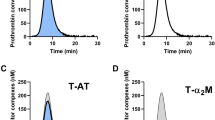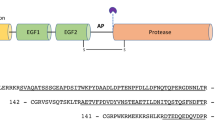Abstract
IT is known experimentally that changes in blood-clotting occur under shock. In general, the blood takes longer to coagulate in anaphylactic and peptone shock, while in histamine shock the observations made have been rather uncertain. To clear up the question, we have used the method worked out by Gerendàs1,2 for investigating thrombin inactivation.
This is a preview of subscription content, access via your institution
Access options
Subscribe to this journal
Receive 51 print issues and online access
$199.00 per year
only $3.90 per issue
Buy this article
- Purchase on Springer Link
- Instant access to full article PDF
Prices may be subject to local taxes which are calculated during checkout
Similar content being viewed by others
References
Gerendàs, M., Acta Hung. Physiol, 1, 97 (1948).
Gerendàs, M., Schweiz. Med. Wschr. (in the press).
Csefkó, I., Gerendàs, M., and Udvardy, M. D. F. (in the press).
Csefkó, I., Gerendàs, M., and Udvardy, M. D. F., Arch. Biol. Hung., 18, 193 (1948).
Csefkó, I., Gerendàs, M., and Udvardy, M. D. F., Arch. Biol. Hung., 18, 200 (1948).
Kyes, P., and Strausser, E. R., J. Immunol., 12, 419 (1926).
Gerendàs, M., Csefkó, I., and Udvardy, M. D. F. (in the press).
Author information
Authors and Affiliations
Rights and permissions
About this article
Cite this article
CSEFKÓ, I., GERENDÀS, M. & UDVARDY, M. Shock Phenomena and Thrombin Inactivation. Nature 163, 806–807 (1949). https://doi.org/10.1038/163806a0
Issue Date:
DOI: https://doi.org/10.1038/163806a0
This article is cited by
-
Thrombelastographische Untersuchungen in vitro mit Heparin, Histamin, Serotonin, Protamin und Theophyllin-Nikotinat
Blut Zeitschrift für die Gesamte Blutforschung (1966)
Comments
By submitting a comment you agree to abide by our Terms and Community Guidelines. If you find something abusive or that does not comply with our terms or guidelines please flag it as inappropriate.



